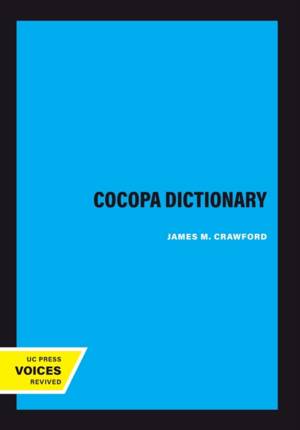
- Afhalen na 1 uur in een winkel met voorraad
- Gratis thuislevering in België vanaf € 30
- Ruim aanbod met 7 miljoen producten
- Afhalen na 1 uur in een winkel met voorraad
- Gratis thuislevering in België vanaf € 30
- Ruim aanbod met 7 miljoen producten
Zoeken
€ 93,45
+ 186 punten
Uitvoering
Omschrijving
The Cocopa Dictionary serves as a vital resource in documenting and preserving the Cocopa language, a member of the Yuman family, spoken by communities in southwestern Arizona and northern Mexico. With a heritage rooted in the Colorado River delta region, this language connects its speakers to a rich history of cultural and environmental adaptation. Based on over 21 months of immersive fieldwork from 1963 to 1979, the dictionary captures the intricacies of Cocopa grammar, vocabulary, and syntax, offering a window into a language at risk of disappearing. This work synthesizes both firsthand data and historical records, providing a comprehensive linguistic resource that preserves the voices and knowledge of the Cocopa people for future generations. Designed for linguists, educators, and those invested in indigenous language preservation, the Cocopa Dictionary provides detailed grammatical analyses, including noun inflections, verb constructions, and sentence structures. It highlights the dynamic nature of the language, noting generational variations in speech patterns while addressing its synthetic and agglutinative morphology. In addition to linguistic data, the dictionary includes cultural insights, connecting words and expressions to their social and historical contexts. By meticulously recording the language's complexity and resilience, this work not only celebrates the Cocopa people's linguistic heritage but also serves as a critical tool for revitalization efforts, ensuring that this invaluable piece of human history endures. This title is part of UC Press's Voices Revived program, which commemorates University of California Press's mission to seek out and cultivate the brightest minds and give them voice, reach, and impact. Drawing on a backlist dating to 1893, Voices Revived makes high-quality, peer-reviewed scholarship accessible once again using print-on-demand technology. This title was originally published in 1989.
Specificaties
Betrokkenen
- Auteur(s):
- Uitgeverij:
Inhoud
- Aantal bladzijden:
- 544
- Taal:
- Engels
- Reeks:
Eigenschappen
- Productcode (EAN):
- 9780520398924
- Verschijningsdatum:
- 28/04/2023
- Uitvoering:
- Paperback
- Formaat:
- Trade paperback (VS)
- Afmetingen:
- 178 mm x 254 mm
- Gewicht:
- 934 g

Alleen bij Standaard Boekhandel
+ 186 punten op je klantenkaart van Standaard Boekhandel
Beoordelingen
We publiceren alleen reviews die voldoen aan de voorwaarden voor reviews. Bekijk onze voorwaarden voor reviews.











